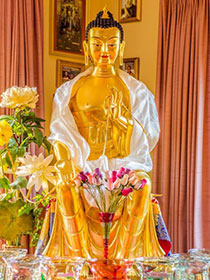- Home
- FPMT Homepage
Foundation for the Preservation of the Mahayana Tradition
The FPMT is an organization devoted to preserving and spreading Mahayana Buddhism worldwide by creating opportunities to listen, reflect, meditate, practice and actualize the unmistaken teachings of the Buddha and based on that experience spreading the Dharma to sentient beings. We provide integrated education through which people’s minds and hearts can be transformed into their highest potential for the benefit of others, inspired by an attitude of universal responsibility and service. We are committed to creating harmonious environments and helping all beings develop their full potential of infinite wisdom and compassion. Our organization is based on the Buddhist tradition of Lama Tsongkhapa of Tibet as taught to us by our founders Lama Thubten Yeshe and Lama Thubten Zopa Rinpoche.
- Willkommen
Die Stiftung zur Erhaltung der Mahayana Tradition (FPMT) ist eine Organisation, die sich weltweit für die Erhaltung und Verbreitung des Mahayana-Buddhismus einsetzt, indem sie Möglichkeiten schafft, den makellosen Lehren des Buddha zuzuhören, über sie zur reflektieren und zu meditieren und auf der Grundlage dieser Erfahrung das Dharma unter den Lebewesen zu verbreiten.
Wir bieten integrierte Schulungswege an, durch denen der Geist und das Herz der Menschen in ihr höchstes Potential verwandelt werden zum Wohl der anderen – inspiriert durch eine Haltung der universellen Verantwortung und dem Wunsch zu dienen. Wir haben uns verpflichtet, harmonische Umgebungen zu schaffen und allen Wesen zu helfen, ihr volles Potenzial unendlicher Weisheit und grenzenlosen Mitgefühls zu verwirklichen.
Unsere Organisation basiert auf der buddhistischen Tradition von Lama Tsongkhapa von Tibet, so wie sie uns von unseren Gründern Lama Thubten Yeshe und Lama Thubten Zopa Rinpoche gelehrt wird.
- Bienvenidos
La Fundación para la preservación de la tradición Mahayana (FPMT) es una organización que se dedica a preservar y difundir el budismo Mahayana en todo el mundo, creando oportunidades para escuchar, reflexionar, meditar, practicar y actualizar las enseñanzas inconfundibles de Buda y en base a esa experiencia difundir el Dharma a los seres.
Proporcionamos una educación integrada a través de la cual las mentes y los corazones de las personas se pueden transformar en su mayor potencial para el beneficio de los demás, inspirados por una actitud de responsabilidad y servicio universales. Estamos comprometidos a crear ambientes armoniosos y ayudar a todos los seres a desarrollar todo su potencial de infinita sabiduría y compasión.
Nuestra organización se basa en la tradición budista de Lama Tsongkhapa del Tíbet como nos lo enseñaron nuestros fundadores Lama Thubten Yeshe y Lama Zopa Rinpoche.
A continuación puede ver una lista de los centros y sus páginas web en su lengua preferida.
- Bienvenue
L’organisation de la FPMT a pour vocation la préservation et la diffusion du bouddhisme du mahayana dans le monde entier. Elle offre l’opportunité d’écouter, de réfléchir, de méditer, de pratiquer et de réaliser les enseignements excellents du Bouddha, pour ensuite transmettre le Dharma à tous les êtres. Nous proposons une formation intégrée grâce à laquelle le cœur et l’esprit de chacun peuvent accomplir leur potentiel le plus élevé pour le bien d’autrui, inspirés par le sens du service et une responsabilité universelle. Nous nous engageons à créer un environnement harmonieux et à aider tous les êtres à épanouir leur potentiel illimité de compassion et de sagesse. Notre organisation s’appuie sur la tradition guéloukpa de Lama Tsongkhapa du Tibet, telle qu’elle a été enseignée par nos fondateurs Lama Thoubtèn Yéshé et Lama Zopa Rinpoché.
Visitez le site de notre Editions Mahayana pour les traductions, conseils et nouvelles du Bureau international en français.
Voici une liste de centres et de leurs sites dans votre langue préférée
- Benvenuto
L’FPMT è un organizzazione il cui scopo è preservare e diffondere il Buddhismo Mahayana nel mondo, creando occasioni di ascolto, riflessione, meditazione e pratica dei perfetti insegnamenti del Buddha, al fine di attualizzare e diffondere il Dharma fra tutti gli esseri senzienti.
Offriamo un’educazione integrata, che può trasformare la mente e i cuori delle persone nel loro massimo potenziale, per il beneficio di tutti gli esseri, ispirati da un’attitudine di responsabilità universale e di servizio.
Il nostro obiettivo è quello di creare contesti armoniosi e aiutare tutti gli esseri a sviluppare in modo completo le proprie potenzialità di infinita saggezza e compassione.
La nostra organizzazione si basa sulla tradizione buddhista di Lama Tsongkhapa del Tibet, così come ci è stata insegnata dai nostri fondatori Lama Thubten Yeshe e Lama Zopa Rinpoche.
Di seguito potete trovare un elenco dei centri e dei loro siti nella lingua da voi prescelta.
- 欢迎 / 歡迎
简体中文
“护持大乘法脉基金会”( 英文简称:FPMT。全名:Foundation for the Preservation of the Mahayana Tradition) 是一个致力于护持和弘扬大乘佛法的国际佛教组织。我们提供听闻,思维,禅修,修行和实证佛陀无误教法的机会,以便让一切众生都能够享受佛法的指引和滋润。
我们全力创造和谐融洽的环境, 为人们提供解行并重的完整佛法教育,以便启发内在的环宇悲心及责任心,并开发内心所蕴藏的巨大潜能 — 无限的智慧与悲心 — 以便利益和服务一切有情。
FPMT的创办人是图腾耶喜喇嘛和喇嘛梭巴仁波切。我们所修习的是由两位上师所教导的,西藏喀巴大师的佛法传承。
繁體中文
護持大乘法脈基金會”( 英文簡稱:FPMT。全名:Found
ation for the Preservation of the Mahayana Tradition ) 是一個致力於護持和弘揚大乘佛法的國際佛教組織。我們提供聽聞, 思維,禪修,修行和實證佛陀無誤教法的機會,以便讓一切眾生都能 夠享受佛法的指引和滋潤。 我們全力創造和諧融洽的環境,
為人們提供解行並重的完整佛法教育,以便啟發內在的環宇悲心及責 任心,並開發內心所蘊藏的巨大潛能 — 無限的智慧與悲心 – – 以便利益和服務一切有情。 FPMT的創辦人是圖騰耶喜喇嘛和喇嘛梭巴仁波切。
我們所修習的是由兩位上師所教導的,西藏喀巴大師的佛法傳承。 察看道场信息:
- FPMT Homepage
- News/Media
-
- Study & Practice
-
-
- About FPMT Education Services
- Latest News
- Programs
- New to Buddhism?
- Buddhist Mind Science: Activating Your Potential
- Heart Advice for Death and Dying
- Discovering Buddhism
- Living in the Path
- Exploring Buddhism
- FPMT Basic Program
- FPMT Masters Program
- FPMT In-Depth Meditation Training
- Maitripa College
- Lotsawa Rinchen Zangpo Translator Program
- Universal Education for Compassion & Wisdom
- Online Learning Center
-
- Prayers & Practice Materials
- Overview of Prayers & Practices
- Full Catalogue of Prayers & Practice Materials
- Explore Popular Topics
- Benefiting Animals
- Chenrezig Resources
- Death & Dying Resources
- Lama Chopa (Guru Puja)
- Lama Zopa Rinpoche: Compendium of Precious Instructions
- Lama Zopa Rinpoche: Life Practice Advice
- Lama Zopa Rinpoche Practice Series
- Lamrim Resources
- Mantras
- Prayer Book Updates
- Purification Practices
- Sutras
- Thought Transformation (Lojong)
- Audio Materials
- Dharma Dates - Tibetan Calendar
- Translation Services
- Publishing Services
- Ways to Offer Support
- Prayers & Practice Materials
-
- Teachings and Advice
- Find Teachings and Advice
- Lama Zopa Rinpoche Advice Page
- Lama Zopa Rinpoche: Compendium of Precious Instructions
- Lama Zopa Rinpoche Video Teachings
- ༧སྐྱབས་རྗེ་བཟོད་པ་རིན་པོ་ཆེ་མཆོག་ནས་སྩལ་བའི་བཀའ་སློབ་བརྙན་འཕྲིན།
- Podcasts
- Lama Yeshe Wisdom Archive
- Buddhism FAQ
- Dharma for Young People
- Resources on Holy Objects
- Teachings and Advice
-
-
*If a menu item has a submenu clicking once will expand the menu clicking twice will open the page.
-
-
- Centers
-
- Teachers
-
- Projects
-
-
-
-
*If a menu item has a submenu clicking once will expand the menu clicking twice will open the page.
-
-
- FPMT
-
- Shop
-
-
-
The Foundation Store is FPMT’s online shop and features a vast selection of Buddhist study and practice materials written or recommended by our lineage gurus. These items include homestudy programs, prayers and practices in PDF or eBook format, materials for children, and other resources to support practitioners.
Items displayed in the shop are made available for Dharma practice and educational purposes, and never for the purpose of profiting from their sale. Please read FPMT Foundation Store Policy Regarding Dharma Items for more information.
-
-
2
The Karmic Bond That Connected Us All in Mongolia
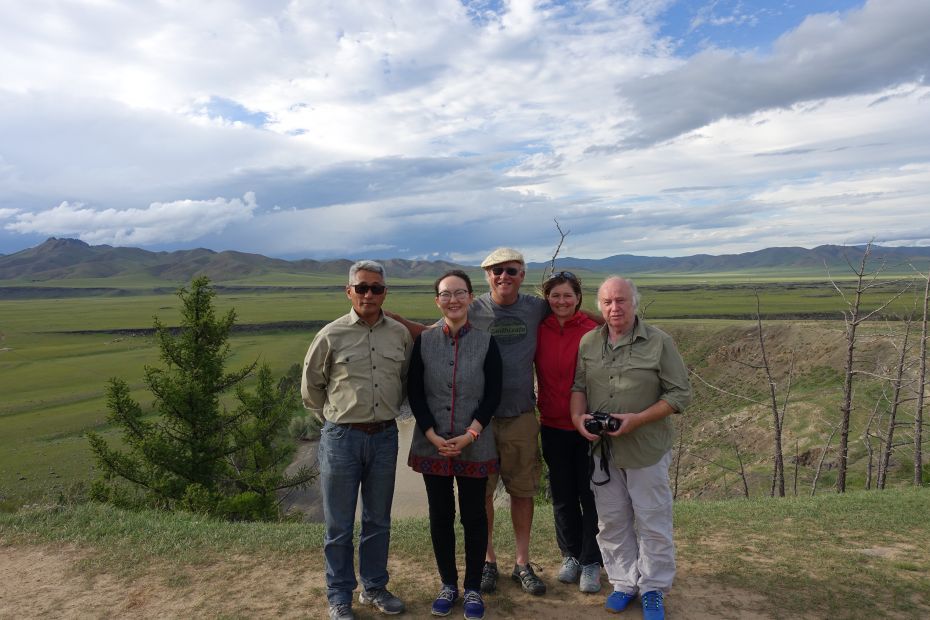
Feature image: Elena, and Cees on pilgrimage in Mongolia, August 2018. Photo courtesy of Ianzhina Bartanova.
Ianzhina Bartanova, director of FPMT center Ganden Do Ngag Shedrup Ling in Ulaanbaatar, Mongolia, shares about an August 2018 fourteen-day pilgrimage the center organized to holy sites in Mongolia.
Ganden Do Ngag Shedrup Ling placed an advertisement in the January-June 2018 issue of FPMT’s Mandala magazine inviting readers to join us for an August 2018 pilgrimage to the holy sites in Mongolia. It was the first pilgrimage for Western Buddhists organized by Ganden Do Ngag Shedrup Ling. Three courageous students from Bulgaria, Holland, and the US arrived in Mongolia in mid-August for the eleven-day pilgrimage, which later expanded into fourteen days.
The capital of Mongolia, Ulaanbaatar, is impressive: tall modern buildings, busy traffic, expensive cars on the roads, fancy restaurants with international cuisine including vegan and vegetarian options, comfortable hotels, and smiling people.
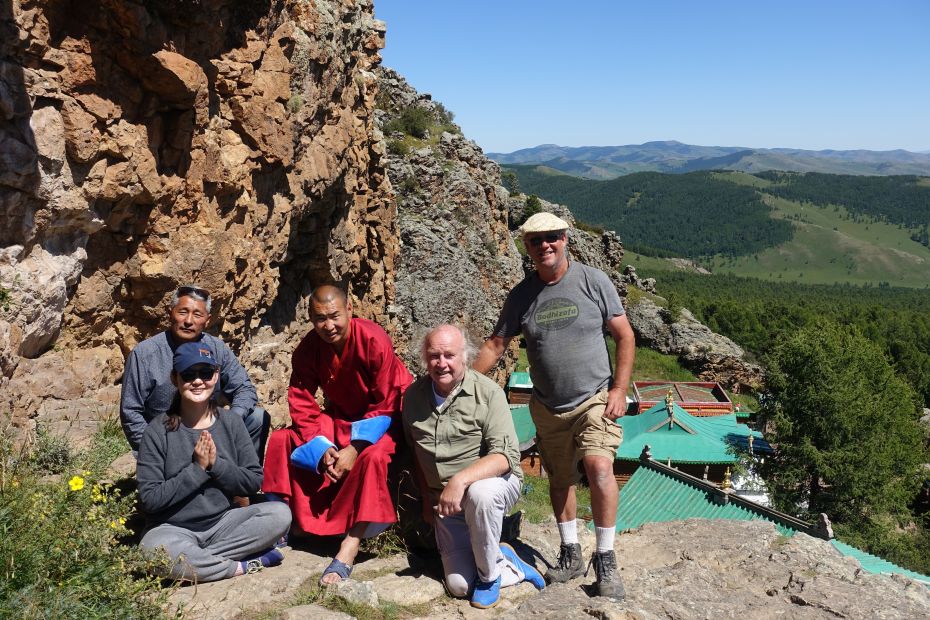
Driver Oyunbaatar, Ganden Do Ngag Shedrup Ling center director Ianzhina, a lama from Tuvkhun Monastery, Cees, and Bill in Mongolia, August 2018. Photo courtesy of Ianzhina Bartanova.
But the real jewels of our pilgrimage were the Mongolian monasteries, some of which were destroyed and then restored. A few survived the Communist purges of the 1930s and are home to some hidden artifacts, which were buried in the ground. Like the canvas for a masterpiece, Mongolia’s natural environment provided a framed backdrop for the holy sites, which appear like beautiful jewelry.
Together with the pilgrims, we visited approximately ten monasteries, took in a few natural sights, and made some visits related to Buddhist museums. When developing the itinerary, we recognized the importance of sharing some cultural aspects and traditions so our guests could have a richer experience of Mongolia. Therefore, we included some secular activities such as a traditional music show and a sightseeing visit to the largest Genghis Khan equestrian statue.
Our journey commenced in Ulaanbaatar at Gandan Tegchenling Monastery, the center of Mongolian Buddhism. It was the only Buddhist monastery preserved during the Socialist era. Joseph Stalin had the wish to demonstrate to the whole capitalist world that there was religious freedom in a socialist country.
Another special feature is that many monasteries in the countryside are located on hills or on top of a mountain. With each visit, we were able to enjoy not only the spiritual heritage of the place, but also breathtaking panoramic views.
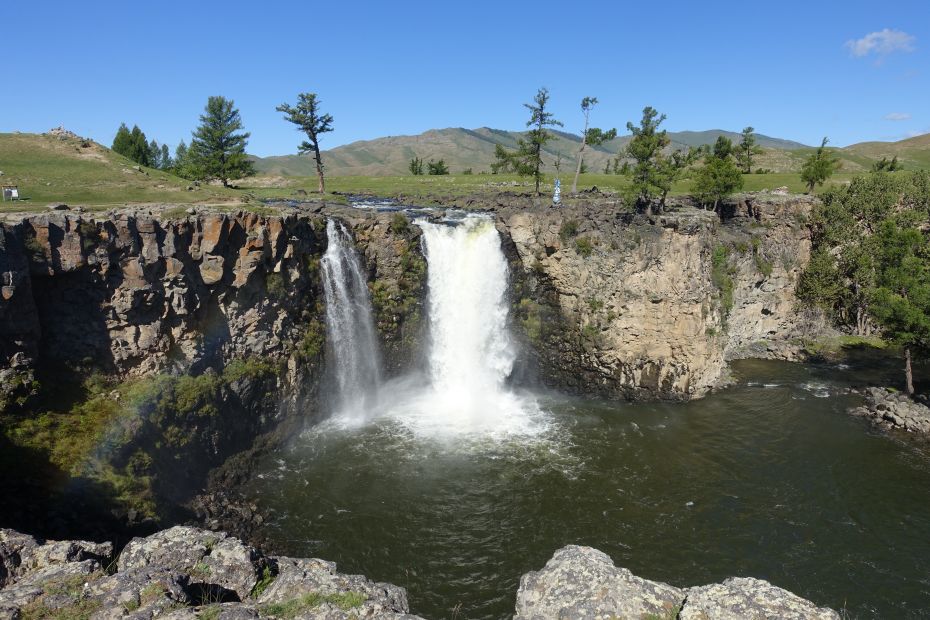
A large waterfall in Mongolia, August 2018. Photo by Ianzhina Bartanova.
The peak experience of our journey was visiting Tuvkhun Monastery, on top of Shireet Ulaan Uul mountain. Tuvkhun Monastery was founded by the great bodhisattva Zanabazar, the first Jebtsundamba, the “Dalai Lama” of Mongolia. We were able to feel the powerful and blessed energy of the monastery.
During our spiritual practices we experienced some obstacles, which we viewed as helping us to purify our collective and individual negative karmas. Major lessons of the pilgrimage were around purification of negative karma and the accumulation of merits. We practiced patience by sitting up in a vehicle for twelve hours. Our backs and buttocks were well and truly massaged by the end!
Actually we could call ourselves very fortunate because we were able to see the flood in the Gobi Desert! It was an unimaginable and almost impossible natural phenomenon—a rare sight! Due to the flood in the Gobi Desert, the only road leading to Khamar Monastery had been washed away. We had no alternative but to turn back after one full day of driving. Most of the group returned to this destination at a later time, when the ground had dried. This is the reason our pilgrimage was extended for a further three days.
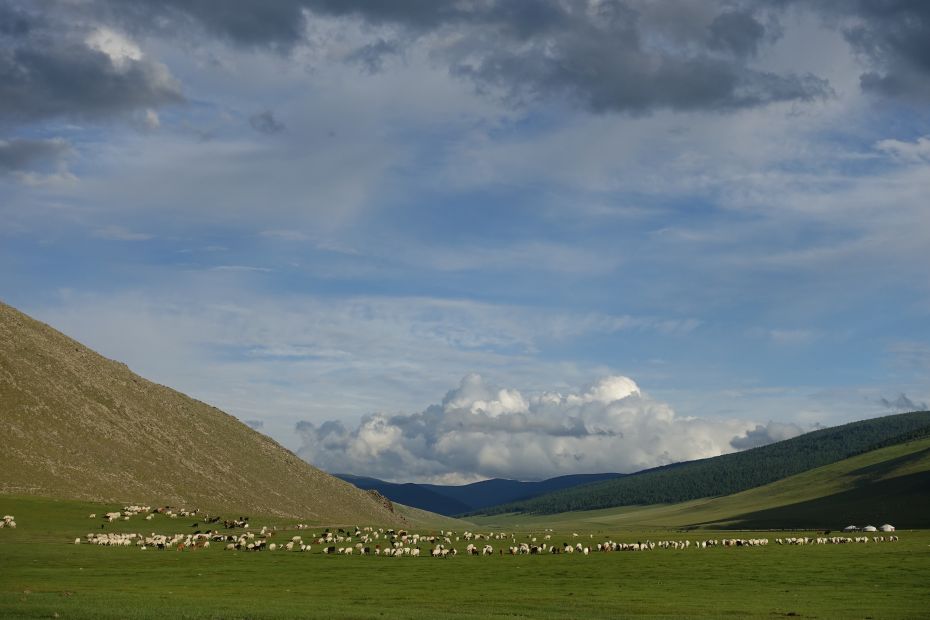
A valley with grazing animals, Mongolia, August 2018. Photo by Ianzhina Bartanova.
There were some other obstacles, such as tensions and closed restaurants. However, reflecting upon how the pilgrimage impacted myself, I can say that all challenges were not an issue providing a correct motivation was maintained for our activities. Serving the Guru is the best one. Through correct devotion and service to the Guru we can purify hundreds of eons of negative karma and benefit many sentient beings around us.
Lama Zopa Rinpoche said, “Pilgrimage needs faith. The more faith, the more happiness. Otherwise, you are just like a tourist looking at ruins.”
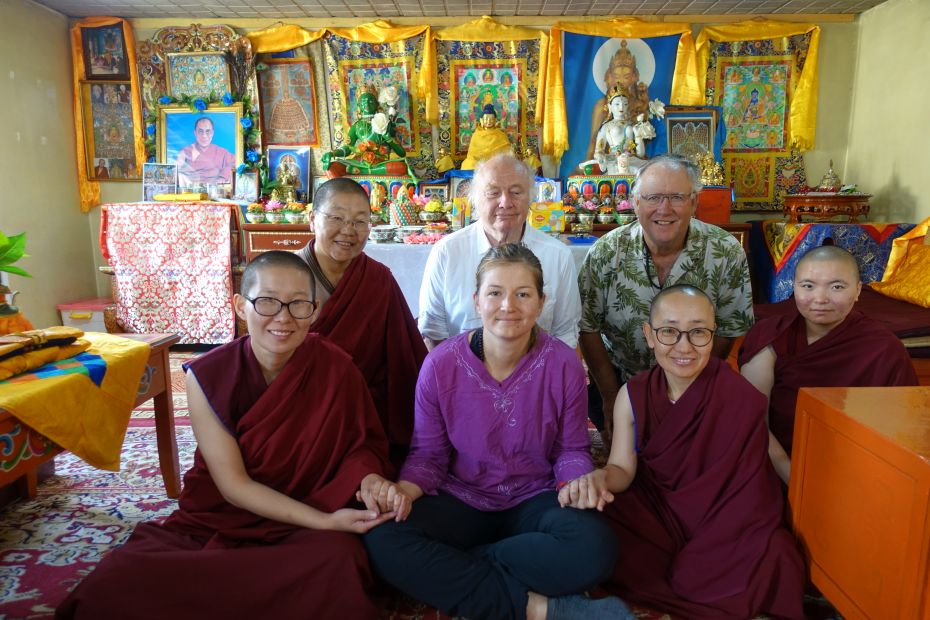
Ani Dechen, Ani Baljid, Cees, Elena, Bill, Ani Nyima, and Ani Choden at Ganden Do Ngag Shedrup Ling, Ulaanbaatar, Mongolia, August 2018. Photo by Ianzhina Bartanova.
Following Rinpoche’s advice, we recited Dharma prayers and did practices at every place we visited. We recited the names of the Thirty-five Buddhas, lamrim prayers, and the great bodhisattva Zanabazar’s special prayer. Ven. Thubten Gyalmo, our resident teacher, kindly guided us through setting a proper motivation at the beginning of our pilgrimage and a making our dedications at the end.
It was very interesting to observe the play of our respective karmas in such a short time. On the tenth day of our pilgrimage, we were blessed with an audience with Jhado Rinpoche! A wonderful surprise for us all! As novices on the Dharma path, we couldn’t imagine that Rinpoche would find time in his very busy schedule to talk to us.
By the end of the pilgrimage we had all become great friends. We are not sure if our paths will cross again. However, we admit that there was a strong karmic bond that connected us all in Mongolia.
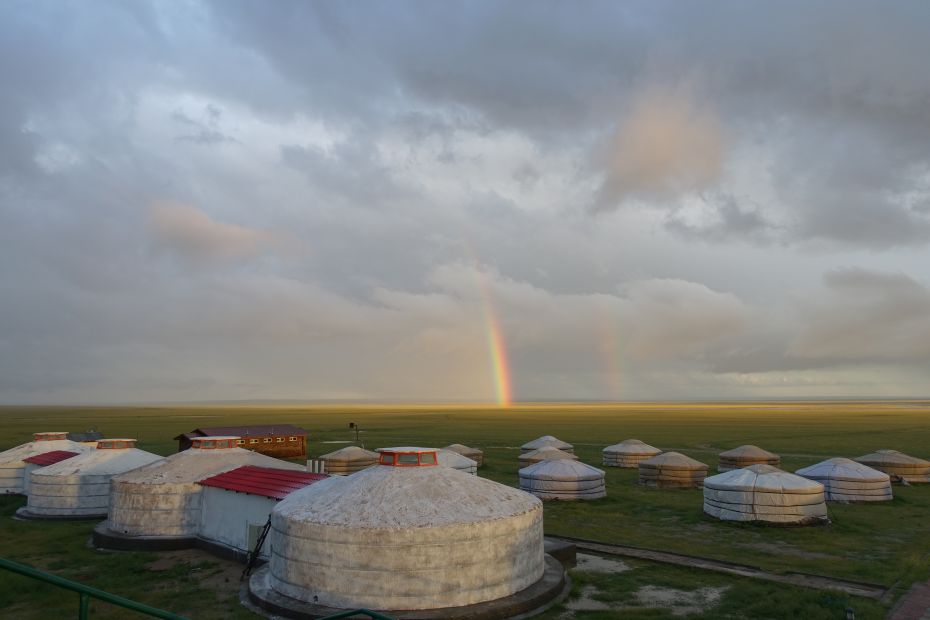
Ger camp in Mongolia, August 2018. Photo by Ianzhina Bartanova.
I will conclude my story with one special highlight. One night when we were in the middle of nowhere, in an eco ger camp without electricity and water, we saw an exquisite night sky full of bright stars. I had the impression that I could reach up and touch the sky, and all of these stars were bound together like one shiny net. So likewise were we linked together in the net of samsara.
For more information about Ganden Do Ngag Shedrup Ling, visit their website:
http://www.fpmtmongolia.org/shedrub-ling-center
- Home
- News/Media
- Study & Practice
- About FPMT Education Services
- Latest News
- Programs
- New to Buddhism?
- Buddhist Mind Science: Activating Your Potential
- Heart Advice for Death and Dying
- Discovering Buddhism
- Living in the Path
- Exploring Buddhism
- FPMT Basic Program
- FPMT Masters Program
- FPMT In-Depth Meditation Training
- Maitripa College
- Lotsawa Rinchen Zangpo Translator Program
- Universal Education for Compassion & Wisdom
- Online Learning Center
- Prayers & Practice Materials
- Overview of Prayers & Practices
- Full Catalogue of Prayers & Practice Materials
- Explore Popular Topics
- Benefiting Animals
- Chenrezig Resources
- Death & Dying Resources
- Lama Chopa (Guru Puja)
- Lama Zopa Rinpoche: Compendium of Precious Instructions
- Lama Zopa Rinpoche: Life Practice Advice
- Lama Zopa Rinpoche Practice Series
- Lamrim Resources
- Mantras
- Prayer Book Updates
- Purification Practices
- Sutras
- Thought Transformation (Lojong)
- Audio Materials
- Dharma Dates – Tibetan Calendar
- Translation Services
- Publishing Services
- Teachings and Advice
- Find Teachings and Advice
- Lama Zopa Rinpoche Advice Page
- Lama Zopa Rinpoche: Compendium of Precious Instructions
- Lama Zopa Rinpoche Video Teachings
- ༧སྐྱབས་རྗེ་བཟོད་པ་རིན་པོ་ཆེ་མཆོག་ནས་སྩལ་བའི་བཀའ་སློབ་བརྙན་འཕྲིན།
- Podcasts
- Lama Yeshe Wisdom Archive
- Buddhism FAQ
- Dharma for Young People
- Resources on Holy Objects
- Ways to Offer Support
- Centers
- Affiliates Area
- Teachers
- Projects
- Charitable Projects
- Make a Donation
- Applying for Grants
- News about Projects
- Other Projects within FPMT
- Support International Office
- Projects Photo Galleries
- Give Where Most Needed
- FPMT
- Shop
Translate*
*powered by Google TranslateTranslation of pages on fpmt.org is performed by Google Translate, a third party service which FPMT has no control over. The service provides automated computer translations that are only an approximation of the websites' original content. The translations should not be considered exact and only used as a rough guide.Letting go of attachment brings inner satisfaction and peace.







